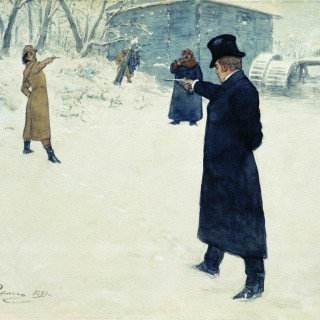
01.01.1833
101
Poetry
Tekst piosenki
Rural Life
'La Morale est dans la nature des choses.'—Necker
I
THE less we love a lady fair
The easier 'tis to gain her grace,
And the more surely we ensnare
Her in the pitfalls which we place.
Time was when cold seduction strove
To swagger as the art of love,
Everywhere trumpeting its feats,
Not seeking love but sensual sweets.
But this amusement delicate
Was worthy of that old baboon,
Our fathers used to dote upon;
The Lovelaces are out of date,
Their glory with their heels of red
And long perukes hath vanished.
II
For who imposture can endure,
A constant harping on one tune,
Serious endeavours to assure
What everybody long has known;
Ever to hear the same replies
And overcome antipathies
Which never have existed, e'en
In little maidens of thirteen?
And what like menaces fatigues,
Entreaties, oaths, fictitious fear,
Epistles of six sheets or near,
Rings, tears, deceptions and intrigues,
Aunts, mothers and their scrutiny,
And husbands' tedious amity?
III
Such were the musings of Eugene.
He in the early years of life
Had a deluded victim been
Of error and the passions' strife.
By daily life deteriorated,
Awhile this beauty captivated,
And that no longer could inspire.
Slowly exhausted by desire,
Yet satiated with success,
In solitude or worldly din,
He heard his soul's complaint within,
With laughter smothered weariness:
And thus he spent eight years of time,
Destroyed the blossom of his prime.
IV
Though beauty he no more adored,
He still made love in a queer way;
Rebuffed—as quickly reassured,
Jilted—glad of a holiday.
Without enthusiasm he met
The fair, nor parted with regret,
Scarce mindful of their love and guile.
Thus a guest with composure will
To take a hand at whist oft come:
He takes his seat, concludes his game,
And straight returning whence he came,
Tranquilly goes to sleep at home,
And in the morning doth not know
Whither that evening he will go.
V
However, Tania's letter reading,
Eugene was touched with sympathy;
The language of her girlish pleading
Aroused in him sweet reverie.
He called to mind Tattiana's grace,
Pallid and melancholy face,
And in a vision, sinless, bright,
His spirit sank with strange delight.
May be the empire of the sense,
Regained authority awhile,
But he desired not to beguile
Such open-hearted innocence.
But to the garden once again
Wherein we lately left the twain.
VI
Two minutes they in silence spent,
Oneguine then approached and said:
"You have a letter to me sent.
Do not excuse yourself. I read
Confessions which a trusting heart
May well in innocence impart.
Charming is your sincerity,
Feelings which long had ceased to be
It wakens in my breast again.
But I came not to adulate:
Your frankness I shall compensate
By an avowal just as plain.
An ear to my confession lend;
To thy decree my will I bend.
VII
"If the domestic hearth could bless—
My sum of happiness contained;
If wife and children to possess
A happy destiny ordained:
If in the scenes of home I might
E'en for an instant find delight,
Then, I say truly, none but thee
I would desire my bride to be—
I say without poetic phrase,
Found the ideal of my youth,
Thee only would I choose, in truth,
As partner of my mournful days,
Thee only, pledge of all things bright,
And be as happy—as I might.
VIII
"But strange am I to happiness;
'Tis foreign to my cast of thought;
Me your perfections would not bless;
I am not worthy them in aught;
And honestly 'tis my belief
Our union would produce but grief.
Though now my love might be intense,
Habit would bring indifference.
I see you weep. Those tears of yours
Tend not my heart to mitigate,
But merely to exasperate;
Judge then what roses would be ours,
What pleasures Hymen would prepare
For us, may be for many a year.
IX
"What can be drearier than the house,
Wherein the miserable wife
Deplores a most unworthy spouse
And leads a solitary life?
The tiresome man, her value knowing,
Yet curses on his fate bestowing,
Is full of frigid jealousy,
Mute, solemn, frowning gloomily.
Such am I. This did ye expect,
When in simplicity ye wrote
Your innocent and charming note
With so much warmth and intellect?
Hath fate apportioned unto thee
This lot in life with stern decree?
X
"Ideas and time ne'er backward move;
My soul I cannot renovate—
I love you with a brother's love,
Perchance one more affectionate.
Listen to me without disdain.
A maid hath oft, may yet again
Replace the visions fancy drew;
Thus trees in spring their leaves renew
As in their turn the seasons roll.
'Tis evidently Heaven's will
You fall in love again. But still—
Learn to possess more self-control.
Not all will like myself proceed—
And thoughtlessness to woe might lead."
XI
Thus did our friend Oneguine preach:
Tattiana, dim with tears her eyes,
Attentive listened to his speech,
All breathless and without replies.
His arm he offers. Mute and sad
(Mechanically, let us add),
Tattiana doth accept his aid;
And, hanging down her head, the maid
Around the garden homeward hies.
Together they returned, nor word
Of censure for the same incurred;
The country hath its liberties
And privileges nice allowed,
Even as Moscow, city proud.
XII
Confess, O ye who this peruse,
Oneguine acted very well
By poor Tattiana in the blues;
'Twas not the first time, I can tell
You, he a noble mind disclosed,
Though some men, evilly disposed,
Spared him not their asperities.
His friends and also enemies
(One and the same thing it may be)
Esteemed him much as the world goes.
Yes! every one must have his foes,
But Lord! from friends deliver me!
The deuce take friends, my friends, amends
I've had to make for having friends!
XIII
But how? Quite so. Though I dismiss
Dark, unavailing reverie,
I just hint, in parenthesis,
There is no stupid calumny
Born of a babbler in a loft
And by the world repeated oft,
There is no fishmarket retort
And no ridiculous report,
Which your true friend with a sweet smile
Where fashionable circles meet
A hundred times will not repeat,
Quite inadvertently meanwhile;
And yet he in your cause would strive
And loves you as—a relative!
XIV
Ahem! Ahem! My reader noble,
Are all your relatives quite well?
Permit me; is it worth the trouble
For your instruction here to tell
What I by relatives conceive?
These are your relatives, believe:
Those whom we ought to love, caress,
With spiritual tenderness;
Whom, as the custom is of men,
We visit about Christmas Day,
Or by a card our homage pay,
That until Christmas comes again
They may forget that we exist.
And so—God bless them, if He list.
XV
In this the love of the fair sex
Beats that of friends and relatives:
In love, although its tempests vex,
Our liberty at least survives:
Agreed! but then the whirl of fashion,
The natural fickleness of passion,
The torrent of opinion,
And the fair sex as light as down!
Besides the hobbies of a spouse
Should be respected throughout life
By every proper-minded wife,
And this the faithful one allows,
When in as instant she is lost,—
Satan will jest, and at love's cost.
XVI
Oh! where bestow our love? Whom trust?
Where is he who doth not deceive?
Who words and actions will adjust
To standards in which we believe?
Oh! who is not calumnious?
Who labours hard to humour us?
To whom are our misfortunes grief
And who is not a tiresome thief?
My venerated reader, oh!
Cease the pursuit of shadows vain,
Spare yourself unavailing pain
And all your love on self bestow;
A worthy object 'tis, and well
I know there's none more amiable.
XVII
But from the interview what flowed?
Alas! It is not hard to guess.
The insensate fire of love still glowed
Nor discontinued to distress
A spirit which for sorrow yearned.
Tattiana more than ever burned
With hopeless passion: from her bed
Sweet slumber winged its way and fled.
Her health, life's sweetness and its bloom,
Her smile and maidenly repose,
All vanished as an echo goes.
Across her youth a shade had come,
As when the tempest's veil is drawn
Across the smiling face of dawn.
XVIII
Alas! Tattiana fades away,
Grows pale and sinks, but nothing says;
Listless is she the livelong day
Nor interest in aught betrays.
Shaking with serious air the head,
In whispers low the neighbours said:
'Tis time she to the altar went!
But enough! Now, 'tis my intent
The imagination to enliven
With love which happiness extends;
Against my inclination, friends,
By sympathy I have been driven.
Forgive me! Such the love I bear
My heroine, Tattiana dear.
XIX
Vladimir, hourly more a slave
To youthful Olga's beauty bright,
Into delicious bondage gave
His ardent soul with full delight.
Always together, eventide
Found them in darkness side by side,
At morn, hand clasped in hand, they rove
Around the meadow and the grove.
And what resulted? Drunk with love,
But with confused and bashful air,
Lenski at intervals would dare,
If Olga smilingly approve,
Dally with a dishevelled tress
Or kiss the border of her dress.
XX
To Olga frequently he would
Some nice instructive novel read,
Whose author nature understood
Better than Chateaubriand did
Yet sometimes pages two or three
(Nonsense and pure absurdity,
For maiden's hearing deemed unfit),
He somewhat blushing would omit:
Far from the rest the pair would creep
And (elbows on the table) they
A game of chess would often play,
Buried in meditation deep,
Till absently Vladimir took
With his own pawn alas! his rook!
XXI
Homeward returning, he at home
Is occupied with Olga fair,
An album, fly-leaf of the tome,
He leisurely adorns for her.
Landscapes thereon he would design,
A tombstone, Aphrodite's shrine,
Or, with a pen and colours fit,
A dove which on a lyre doth sit;
The "in memoriam" pages sought,
Where many another hand had signed
A tender couplet he combined,
A register of fleeting thought,
A flimsy trace of musings past
Which might for many ages last.
XXII
Surely ye all have overhauled
A country damsel's album trim,
Which all her darling friends have scrawled
From first to last page to the rim.
Behold! orthography despising,
Metreless verses recognizing
By friendship how they were abused,
Hewn, hacked, and otherwise ill-used.
Upon the opening page ye find:
Qu'ecrirer-vouz sur ces tablettes?
Subscribed, toujours a vous, Annette;
And on the last one, underlined:
Who in thy love finds more delight
Beyond this may attempt to write.
XXIII
Infallibly you there will find
Two hearts, a torch, of flowers a wreath,
And vows will probably be signed:
Affectionately yours till death.
Some army poet therein may
Have smuggled his flagitious lay.
In such an album with delight
I would, my friends, inscriptions write,
Because I should be sure, meanwhile,
My verses, kindly meant, would earn
Delighted glances in return;
That afterwards with evil smile
They would not solemnly debate
If cleverly or not I prate.
XXIV
But, O ye tomes without compare,
Which from the devil's bookcase start,
Albums magnificent which scare
The fashionable rhymester's heart!
Yea! although rendered beauteous
By Tolstoy's pencil marvellous,
Though Baratynski verses penned,(45)
The thunderbolt on you descend!
Whene'er a brilliant courtly dame
Presents her quarto amiably,
Despair and anger seize on me,
And a malicious epigram
Trembles upon my lips from spite,—
And madrigals I'm asked to write!
[Note 45: Count Tolstoy, a celebrated artist who subsequently became Vice-President of the Academy of Arts at St. Petersburg. Baratynski, see Note 43.]
XXV
But Lenski madrigals ne'er wrote
In Olga's album, youthful maid,
To purest love he tuned his note
Nor frigid adulation paid.
What never was remarked or heard
Of Olga he in song averred;
His elegies, which plenteous streamed,
Both natural and truthful seemed.
Thus thou, Yazykoff, dost arise(46)
In amorous flights when so inspired,
Singing God knows what maid admired,
And all thy precious elegies,
Sometime collected, shall relate
The story of thy life and fate.
[Note 46: Yazykoff, a poet contemporary with Pushkin. He was an author of promise—unfulfilled.]
XXVI
Since Fame and Freedom he adored,
Incited by his stormy Muse
Odes Lenski also had outpoured,
But Olga would not such peruse.
When poets lachrymose recite
Beneath the eyes of ladies bright
Their own productions, some insist
No greater pleasure can exist
Just so! that modest swain is blest
Who reads his visionary theme
To the fair object of his dream,
A beauty languidly at rest,
Yes, happy—though she at his side
By other thoughts be occupied.
XXVII
But I the products of my Muse,
Consisting of harmonious lays,
To my old nurse alone peruse,
Companion of my childhood's days.
Or, after dinner's dull repast,
I by the button-hole seize fast
My neighbour, who by chance drew near,
And breathe a drama in his ear.
Or else (I deal not here in jokes),
Exhausted by my woes and rhymes,
I sail upon my lake at times
And terrify a swarm of ducks,
Who, heard the music of my lay,
Take to their wings and fly away.
XXVIII
But to Oneguine! A propos!
Friends, I must your indulgence pray.
His daily occupations, lo!
Minutely I will now portray.
A hermit's life Oneguine led,
At seven in summer rose from bed,
And clad in airy costume took
His course unto the running brook.
There, aping Gulnare's bard, he spanned
His Hellespont from bank to bank,
And then a cup of coffee drank,
Some wretched journal in his hand;
Then dressed himself…(*)
[Note: Stanza left unfinished by the author.]
XXIX
Sound sleep, books, walking, were his bliss,
The murmuring brook, the woodland shade,
The uncontaminated kiss
Of a young dark-eyed country maid,
A fiery, yet well-broken horse,
A dinner, whimsical each course,
A bottle of a vintage white
And solitude and calm delight.
Such was Oneguine's sainted life,
And such unconsciously he led,
Nor marked how summer's prime had fled
In aimless ease and far from strife,
The curse of commonplace delight.
And town and friends forgotten quite.
XXX
This northern summer of our own,
On winters of the south a skit,
Glimmers and dies. This is well known,
Though we will not acknowledge it.
Already Autumn chilled the sky,
The tiny sun shone less on high
And shorter had the days become.
The forests in mysterious gloom
Were stripped with melancholy sound,
Upon the earth a mist did lie
And many a caravan on high
Of clamorous geese flew southward bound.
A weary season was at hand—
November at the gate did stand.
XXXI
The morn arises foggy, cold,
The silent fields no peasant nears,
The wolf upon the highways bold
With his ferocious mate appears.
Detecting him the passing horse
snorts, and his rider bends his course
And wisely gallops to the hill.
No more at dawn the shepherd will
Drive out the cattle from their shed,
Nor at the hour of noon with sound
Of horn in circle call them round.
Singing inside her hut the maid
Spins, whilst the friend of wintry night,
The pine-torch, by her crackles bright.
XXXII
Already crisp hoar frosts impose
O'er all a sheet of silvery dust
(Readers expect the rhyme of rose,
There! take it quickly, if ye must).
Behold! than polished floor more nice
The shining river clothed in ice;
A joyous troop of little boys
Engrave the ice with strident noise.
A heavy goose on scarlet feet,
Thinking to float upon the stream,
Descends the bank with care extreme,
But staggers, slips, and falls. We greet
The first bright wreathing storm of snow
Which falls in starry flakes below.
XXXIII
How in the country pass this time?
Walking? The landscape tires the eye
In winter by its blank and dim
And naked uniformity.
On horseback gallop o'er the steppe!
Your steed, though rough-shod, cannot keep
His footing on the treacherous rime
And may fall headlong any time.
Alone beneath your rooftree stay
And read De Pradt or Walter Scott!(47)
Keep your accounts! You'd rather not?
Then get mad drunk or wroth; the day
Will pass; the same to-morrow try—
You'll spend your winter famously!
[Note 47: The Abbe de Pradt: b. 1759, d. 1837. A political pamphleteer of the French Revolution: was at first an emigre, but made his peace with Napoleon and was appointed Archbishop of Malines.]
XXXIV
A true Childe Harold my Eugene
To idle musing was a prey;
At morn an icy bath within
He sat, and then the livelong day,
Alone within his habitation
And buried deep in meditation,
He round the billiard-table stalked,
The balls impelled, the blunt cue chalked;
When evening o'er the landscape looms,
Billiards abandoned, cue forgot,
A table to the fire is brought,
And he waits dinner. Lenski comes,
Driving abreast three horses gray.
"Bring dinner now without delay!"
XXXV
Upon the table in a trice
Of widow Clicquot or Moet
A blessed bottle, placed in ice,
For the young poet they display.
Like Hippocrene it scatters light,
Its ebullition foaming white
(Like other things I could relate)
My heart of old would captivate.
The last poor obol I was worth—
Was it not so?—for thee I gave,
And thy inebriating wave
Full many a foolish prank brought forth;
And oh! what verses, what delights,
Delicious visions, jests and fights!
XXXVI
Alas! my stomach it betrays
With its exhilarating flow,
And I confess that now-a-days
I prefer sensible Bordeaux.
To cope with Ay no more I dare,
For Ay is like a mistress fair,
Seductive, animated, bright,
But wilful, frivolous, and light.
But thou, Bordeaux, art like the friend
Who in the agony of grief
Is ever ready with relief,
Assistance ever will extend,
Or quietly partake our woe.
All hail! my good old friend Bordeaux!
XXXVII
The fire sinks low. An ashy cloak
The golden ember now enshrines,
And barely visible the smoke
Upward in a thin stream inclines.
But little warmth the fireplace lends,
Tobacco smoke the flue ascends,
The goblet still is bubbling bright—
Outside descend the mists of night.
How pleasantly the evening jogs
When o'er a glass with friends we prate
Just at the hour we designate
The time between the wolf and dogs—
I cannot tell on what pretence—
But lo! the friends to chat commence.
XXXVIII
"How are our neighbours fair, pray tell,
Tattiana, saucy Olga thine?"
"The family are all quite well—
Give me just half a glass of wine—
They sent their compliments—but oh!
How charming Olga's shoulders grow!
Her figure perfect grows with time!
She is an angel! We sometime
Must visit them. Come! you must own,
My friend, 'tis but to pay a debt,
For twice you came to them and yet
You never since your nose have shown.
But stay! A dolt am I who speak!
They have invited you this week."
XXXIX
"Me?"—"Yes! It is Tattiana's fete
Next Saturday. The Larina
Told me to ask you. Ere that date
Make up your mind to go there."—"Ah!
It will be by a mob beset
Of every sort and every set!"
"Not in the least, assured am I!"
"Who will be there?"—"The family.
Do me a favour and appear.
Will you?"—"Agreed."—"I thank you, friend,"
And saying this Vladimir drained
His cup unto his maiden dear.
Then touching Olga they depart
In fresh discourse. Such, love, thou art!
XL
He was most gay. The happy date
In three weeks would arrive for them;
The secrets of the marriage state
And love's delicious diadem
With rapturous longing he awaits,
Nor in his dreams anticipates
Hymen's embarrassments, distress,
And freezing fits of weariness.
Though we, of Hymen foes, meanwhile,
In life domestic see a string
Of pictures painful harrowing,
A novel in Lafontaine's style,
My wretched Lenski's fate I mourn,
He seemed for matrimony born.
XLI
He was beloved: or say at least,
He thought so, and existence charmed.
The credulous indeed are blest,
And he who, jealousy disarmed,
In sensual sweets his soul doth steep
As drunken tramps at nightfall sleep,
Or, parable more flattering,
As butterflies to blossoms cling.
But wretched who anticipates,
Whose brain no fond illusions daze,
Who every gesture, every phrase
In true interpretation hates:
Whose heart experience icy made
And yet oblivion forbade.
Tłumaczenie
Brak
Polecani artyści
Najnowsze teksty piosenek
Sprawdź teksty piosenek i albumy dodane w ciągu ostatnich 7 dni


























